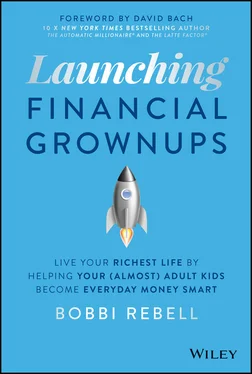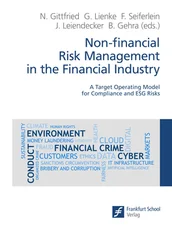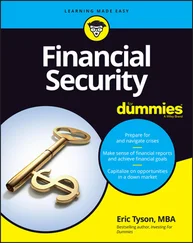Bobbi Rebell - Launching Financial Grownups
Здесь есть возможность читать онлайн «Bobbi Rebell - Launching Financial Grownups» — ознакомительный отрывок электронной книги совершенно бесплатно, а после прочтения отрывка купить полную версию. В некоторых случаях можно слушать аудио, скачать через торрент в формате fb2 и присутствует краткое содержание. Жанр: unrecognised, на английском языке. Описание произведения, (предисловие) а так же отзывы посетителей доступны на портале библиотеки ЛибКат.
- Название:Launching Financial Grownups
- Автор:
- Жанр:
- Год:неизвестен
- ISBN:нет данных
- Рейтинг книги:5 / 5. Голосов: 1
-
Избранное:Добавить в избранное
- Отзывы:
-
Ваша оценка:
- 100
- 1
- 2
- 3
- 4
- 5
Launching Financial Grownups: краткое содержание, описание и аннотация
Предлагаем к чтению аннотацию, описание, краткое содержание или предисловие (зависит от того, что написал сам автор книги «Launching Financial Grownups»). Если вы не нашли необходимую информацию о книге — напишите в комментариях, мы постараемся отыскать её.
Launching Financial Grownups
Launching Financial Grownups
Launching Financial Grownups
Launching Financial Grownups — читать онлайн ознакомительный отрывок
Ниже представлен текст книги, разбитый по страницам. Система сохранения места последней прочитанной страницы, позволяет с удобством читать онлайн бесплатно книгу «Launching Financial Grownups», без необходимости каждый раз заново искать на чём Вы остановились. Поставьте закладку, и сможете в любой момент перейти на страницу, на которой закончили чтение.
Интервал:
Закладка:
“I remember being very mindful every month,” Jason explains. “I didn't really like asking them for the rent. They would always give it. There was never any pressure not to give it, but I wanted to be as financially independent as I could.” In Jason's case, he was very motivated to pay his own rent, and while the plan was not formalized, he did gradually pay more and more of the rent each month as his financial situation improved over the next few years. He stressed to me that he might not have made the move to New York City for that dream job had it not been for his parents' support – both emotionally and financially. It was a strategic financial boost that was money well spent because the end result was a more lucrative and fulfilling career.
Jason's dad was very transparent with him about money during his childhood. Many conversations happened in the car. Jason recalled one memorable conversation in high school when his dad told him how much his dental practice brought in each year. “I remember being shocked by it at the time,” he says. “Because it was a successful dental practice. And then immediately having an understanding of how much money was coming into the family versus how much was being spent.”
Jason's dad Roy has continued to be open with his adult children even as they have had children of their own. “I do tell him exactly what our finances are, what our savings are, what's in the bank, and where we stand financially and my investment strategy.” Roy explained why he felt so compelled to make sure his kids (Jason also has a sister) were aware of money and their family values. His own father, a postal worker, had passed away at age 49, after having not worked for years for medical reasons. At the time of his father's death, Roy was a sophomore in college at State University New York at Albany. “Dad was in charge, and he didn't discuss anything there. His motto was kids were to be seen but not heard.” Roy, his brother, and mom had to fend for themselves. There were lots of money decisions to be made because “our finances were kind of limited,” Roy told me.
Roy didn't want his wife and kids to be in that kind of predicament should anything happen to him. “So I brought to the marriage frankness and openness that everything can be discussed – and that included finances.” Roy also stressed that his wife has been very much an equal in both the financial decision-making and in the discussions with their kids about money. Consistent messaging within the family is essential. The couple also let the children learn about their financial values by example and observation when they were growing up, even as the family became more financially successful. The Feifers lived a low-key lifestyle below their means in South Florida and had a large amount of savings. The parents didn't talk directly about a budget because the kids were already extremely careful with their spending and extremely financially conservative. They led by example, not by lecture.
The one soft spot for Roy was his love of luxury cars. And that's where the tables turned at times with both kids chiming in, urging restraint. At one point, Roy says his daughter, Jody, talked him out of buying her a Lexus, arguing it was too fancy and she would be embarrassed. You see, when it comes to family ecosystems, it's complicated. And parents should be aware that it can be very much a two-way street, especially as the kids get older and have their own distinct points of view when it comes to finances.
That's not to say the Feifers weren't aware of the fine line between productive support with an end goal and throwing money at a child without accountability. “You don't want a kid on the couch watching reality TV shows and not being proactive in securing his financial future. That's an enabler,” Ron assured me. In their case, the kids were working hard and doing everything they could to build their own financial lives. So it made sense to help once they had their own future secured.
I was also struck by something very wise that Roy brought up: a parent–child relationship is a financial relationship. I had never really thought of it that way, and in our society, while few of us would openly frame it that way, it is often the case. We as parents feel societal pressure to use our financial resources on our children. And let's not forget that we may need our children to spend their financial resources on us at one point. There needs to be a family financial ecosystem of mutual support. In many cases it will mostly function as financial resources going from the older generation to the younger, but we all need to be prepared to adapt as needed and as we go through life.
Which brings us back to that phone bill and how it is that Jason, this nonmaterialistic, financially conservative guy still wasn't paying his own bill as he approached age 40.
In short, Jason defended his decision to let his dad keep paying his cell phone bill as part of their family plan – but not because he needs it. After way too many questions about this, it came out that it's basically become a family bonding ritual. Every month Roy sends out an email with things like who sent out the most texts and how much data each person is using. Jason always wins that one, and he blames it on his four-year-old who he says watches a lot of videos at restaurants. His mom wins for most text messages, and his dad wins for voice calls. In other words, the bill is no longer about the money; it's become a game they can play to connect. I'd say money well spent.
Review
1 Even after our young adult children have launched financially, we may want or need to selectively provide support during some of our child's adult life.
2 To be able to provide support for our children, we need to make sure we first prioritize our own financial well-being, and we need our children to understand that our financial needs will take precedence over their wants. Secure your own oxygen mask first, my friends.
3 Candid two-way conversations can help young adults better understand the financial decisions their parents face.
4 Establishing a family financial ecosystem that can adjust as time and needs change will create security. Parents should make sure kids know this might be reciprocal one day.
Notes
1 1. https://www.bankrate.com/pdfs/pr/20190424-financial-independence-survey.pdf
2 2. https://www.creditcards.com/credit-card-news/pay-adult-childrens-debt-poll/
Конец ознакомительного фрагмента.
Текст предоставлен ООО «ЛитРес».
Прочитайте эту книгу целиком, купив полную легальную версию на ЛитРес.
Безопасно оплатить книгу можно банковской картой Visa, MasterCard, Maestro, со счета мобильного телефона, с платежного терминала, в салоне МТС или Связной, через PayPal, WebMoney, Яндекс.Деньги, QIWI Кошелек, бонусными картами или другим удобным Вам способом.
Интервал:
Закладка:
Похожие книги на «Launching Financial Grownups»
Представляем Вашему вниманию похожие книги на «Launching Financial Grownups» списком для выбора. Мы отобрали схожую по названию и смыслу литературу в надежде предоставить читателям больше вариантов отыскать новые, интересные, ещё непрочитанные произведения.
Обсуждение, отзывы о книге «Launching Financial Grownups» и просто собственные мнения читателей. Оставьте ваши комментарии, напишите, что Вы думаете о произведении, его смысле или главных героях. Укажите что конкретно понравилось, а что нет, и почему Вы так считаете.












